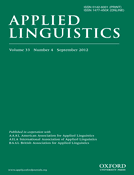
APPLIED LINGUISTICS
Scope & Guideline
Advancing Knowledge in Linguistics and Communication
Introduction
Aims and Scopes
- Language Education and Pedagogy:
Explores innovative teaching methods, curriculum development, and instructional strategies in language education across various contexts and learner demographics. - Sociolinguistics and Language Policy:
Analyzes the social dimensions of language, including issues of identity, power, and policy effects on language use and education, particularly in multilingual and multicultural settings. - Language Assessment and Testing:
Focuses on the methodologies and implications of language testing, emphasizing the validity, reliability, and fairness of assessment practices in educational contexts. - Cognitive and Psycholinguistic Approaches:
Investigates the cognitive processes involved in language acquisition and use, including the effects of bilingualism, language processing, and metacognitive strategies. - Discourse Analysis and Pragmatics:
Examines the use of language in context, looking at how meaning is constructed through discourse in various settings, including digital communication and institutional talk. - Translanguaging and Multilingual Practices:
Studies the fluid use of multiple languages in educational and social contexts, promoting an understanding of language as a dynamic resource for communication. - Critical Applied Linguistics:
Engages with social justice issues in language education and research, critiquing traditional paradigms and advocating for equitable practices.
Trending and Emerging
- Digital Communication and Technology in Language Learning:
There is a growing interest in how digital tools and online platforms affect language learning, assessment, and communication, particularly in the context of remote education. - Decolonial Approaches to Language Education:
Research is increasingly addressing the decolonization of language education, focusing on indigenous languages, heritage speakers, and the critique of colonial language ideologies. - Critical Pedagogy and Social Justice:
Emerging themes emphasize the role of language education in promoting social justice, equity, and inclusivity, reflecting broader societal movements toward equity. - Language and Identity:
The intersection of language with personal and social identities, including issues of race, gender, and sexuality, is gaining prominence in applied linguistics research. - Multimodal Communication:
There is an increasing emphasis on studying communication that combines different modes (e.g., text, visuals, audio), particularly in digital contexts, reflecting how language is used in diverse formats. - Learning Analytics and Data-Driven Approaches:
The use of big data and analytics in understanding language learning processes and outcomes is emerging as a significant area of interest, driven by advancements in technology.
Declining or Waning
- Traditional Grammar Instruction:
Research focused solely on prescriptive grammar instruction appears to be waning, as the field shifts towards more communicative and contextual approaches to language teaching. - Native Speakerism:
While still relevant, the explicit focus on native speaker norms in language education research has declined, giving way to more inclusive and diverse perspectives on language proficiency. - Classical Language Teaching Methods:
Interest in classical methods such as the grammar-translation approach is decreasing, as contemporary research favors task-based and communicative methodologies. - Standardized Testing Models:
The emphasis on traditional standardized testing as the primary measure of language proficiency is diminishing, with a growing focus on alternative assessment methods that consider learner diversity. - Monolingual Instruction:
The focus on monolingual instructional practices is receding, reflecting a broader acceptance of multilingual and translanguaging approaches in language education.
Similar Journals
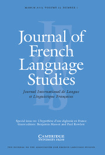
Journal of French Language Studies
Navigating the Evolving Terrain of French LinguisticsJournal of French Language Studies, published by Cambridge University Press, is a prestigious and leading journal in the field of linguistics and language that provides a platform for scholarly articles and research findings relevant to the French language and its various dimensions. With an impressive Q1 ranking in the 2023 categorization and ranked #257 out of 1088 in Scopus for Language and Linguistics, this journal plays a pivotal role in advancing the study of French linguistic methodologies, sociolinguistics, and applied linguistics. Since its inception in 1991, the journal has continually contributed to the academic community, attracting innovative investigations and theoretical discussions that enrich understanding and research in the field. Researchers and students enjoy comprehensive access to critical analysis and emerging trends, and as it continues to converge towards 2024, the journal promises to remain an essential resource for exploring the evolving landscape of French language studies.
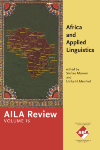
AILA Review
Championing quality research in linguistics and applied studies.AILA Review, published by John Benjamins Publishing Co, stands as a pivotal resource within the field of linguistics and language studies. With an ISSN of 1461-0213 and an E-ISSN of 1570-5595, this journal is dedicated to fostering innovative research and scholarship that advances the understanding of language in its diverse forms and applications. Spanning significant years from 2003 to 2016 and 2018 to 2024, AILA Review has established itself with a commendable reputation, reflected by its Q2 ranking in Linguistics and Language and notable Scopus rankings, positioning it in the 73rd percentile among Arts and Humanities. As an essential forum for researchers, professionals, and students alike, the journal invites high-quality contributions that engage with theoretical and practical aspects of language acquisition, multilingualism, and applied linguistics, enhancing discourse in these vital areas of study. Although not an open-access journal, its commitment to quality ensures that publications are widely recognized and cited, fostering impactful scholarly exchanges.
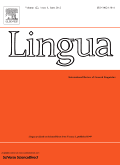
LINGUA
Shaping the future of linguistic exploration and analysis.LINGUA is a premier academic journal dedicated to the field of linguistics, published by ELSEVIER and based in the Netherlands. With an ISSN of 0024-3841 and an E-ISSN of 1872-6135, this esteemed journal has garnered a reputation for excellence, evidenced by its position in the top Q1 quartile in Linguistics and Language as of 2023. LINGUA serves as a vital platform for scholars, researchers, and students, showcasing innovative research and critical discussions across various linguistic subfields. The journal has demonstrated impressive Scopus rankings—151 out of 1088 for Language and Linguistics, and 176 out of 1167 in Social Sciences—placing it in the 86th and 84th percentiles, respectively. By providing a forum for the dissemination of advanced linguistic theories and their applications, LINGUA continues to significantly contribute to the academic community, making it an essential resource for anyone engaged in the study of language.
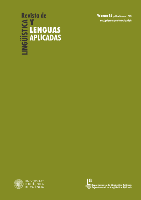
Revista de Linguistica y Lenguas Aplicadas
Innovative Insights for the Linguistic CommunityRevista de Linguistica y Lenguas Aplicadas, an esteemed journal published by UNIV POLITECNICA VALENCIA, EDITORIAL UPV, is a pivotal resource in the field of linguistics and applied languages. Since its inception, the journal has embraced Open Access publishing since 2006, ensuring that its rich repository of research is readily available to a global audience of researchers, academics, and language professionals. Headquartered in Valencia, Spain, the journal contributes significantly to the advancement of linguistics knowledge, boasting a respectable ranking within the Q3 quartile for Linguistics and Language (2023) according to Scopus metrics. It covers a diverse range of topics and methodologies, engaging readers through its commitment to scholarly rigor and innovation. The journal is uniquely positioned to inform and inspire essential discussions from 2015 to 2024, making it a vital platform for emerging linguists and seasoned scholars alike, as they explore the evolving landscapes of language and communication.
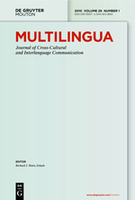
Multilingua-Journal of Cross-Cultural and Interlanguage Communication
Exploring the Rich Tapestry of Multilingual CommunicationMultilingua: Journal of Cross-Cultural and Interlanguage Communication is a premier academic journal published by DE GRUYTER MOUTON, specializing in the dynamic fields of communication and linguistics. Established in 1982, this journal has significantly contributed to the discourse surrounding multilingualism, intercultural interactions, and language acquisition, with a notable reputation backed by an impressive Q1 ranking in both Communication and Linguistics and Language for 2023. Positioned strategically at the heart of Germany, the journal serves as a vital platform for researchers, professionals, and students alike, fostering scholarly exchange and insights into cross-cultural communication practices. With rankings placing it in the top percentiles across key categories in Scopus, including Arts and Humanities and Social Sciences, Multilingua exemplifies the highest standards of academic excellence. Although currently not an Open Access journal, it continues to provide a wealth of knowledge to the global research community.

NEUPHILOLOGISCHE MITTEILUNGEN
Illuminating Contemporary Discussions in LanguageNEUPHILOLOGISCHE MITTEILUNGEN, published by the esteemed Modern Language Society, stands as a significant contribution to the domain of Language and Linguistics. With a history dating back to 1971, this journal has consistently provided an academic platform for researchers and scholars, navigating through the intricacies of philology and linguistic studies. Although it is indexed in Scopus with rankings reflecting its position in the Arts and Humanities and Social Sciences categories, it currently does not offer Open Access, which may require interested parties to seek institutional access for its wealth of content. The journal has experienced periods of coverage discontinuation in recent years, yet it remains a valued source for advancing the understanding of language theories and linguistic practices. Its location in Helsinki, Finland, offers a unique European perspective on global linguistic issues. The journal is ideal for those looking to engage with evolving linguistic trends and contribute to contemporary discussions in the field.
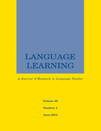
LANGUAGE LEARNING
Elevating discourse in linguistics and education.LANGUAGE LEARNING is a premier academic journal dedicated to advancing the field of language acquisition and education, published by Wiley. With a foundation dating back to 1948, the journal has carved an esteemed niche in the academic landscape, currently holding a prestigious Q1 rank in both the categories of Education and Linguistics and Language. It proudly occupies the 9th percentile rank in the Arts and Humanities domain and the 10th percentile in Social Sciences, illustrating its influence and reach. The journal publishes high-quality research that explores various dimensions of language learning, from cognitive processes to pedagogical approaches, making it an essential resource for researchers, educators, and students alike. Although Access options are non-open, the journal remains accessible to a wide audience, reinforcing its commitment to disseminating critical insights within the academic community.

RLA-Revista de Linguistica Teorica y Aplicada
Exploring the intersections of theory and application in linguistics.RLA-Revista de Linguística Teórica y Aplicada, published by Universidad de Concepción, Facultad de Humanidades y Arte, stands as a vital resource in the field of linguistics, delivering cutting-edge research and scholarly articles that contribute to both theoretical and applied linguistics. With its ISSN 0718-4883, this journal aims to foster robust discussions and innovations in linguistic theory, language acquisition, sociolinguistics, and applied linguistics methodologies. Although the journal currently does not provide open access options, it endeavors to reach a diverse audience, including researchers, professionals, and students, who are keen to explore the rich tapestry of language studies. By offering insights from both local and global perspectives, RLA does not only advance linguistic discourse but also encourages interdisciplinary collaboration, thereby solidifying its role as a pivotal publication in the linguistic academic community.
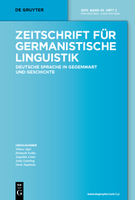
ZEITSCHRIFT FUR GERMANISTISCHE LINGUISTIK
Charting New Territories in Linguistic ResearchZEITSCHRIFT FUR GERMANISTISCHE LINGUISTIK, published by WALTER DE GRUYTER GMBH, stands as a pivotal resource in the field of linguistics since its inception in 1973. With its ISSN 0301-3294 and E-ISSN 1613-0626, this esteemed journal serves as an essential platform for researchers and academics focused on the nuances of the German language and its linguistic frameworks. Catering to a diverse audience, the journal features high-impact articles and contributions consistent with rigorous academic standards, as evident from its Q1 categorization in Linguistics and Language and its notable rankings in both the Arts and Humanities and Social Sciences domains. The journal's commitment to advancing knowledge in linguistics fosters a scholarly environment conducive to both emerging and established linguists. While not available through open access, ZEITSCHRIFT FUR GERMANISTISCHE LINGUISTIK remains influential, drawing readers keen on exploring developmental and educational paradigms alongside linguistic theories. With a convergence of research that spans until 2024, it represents a comprehensive body of work integral to the evolving landscape of linguistic studies in Germany and beyond.
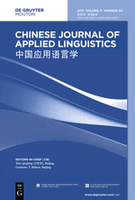
Chinese Journal of Applied Linguistics
Illuminating new paradigms in language learning.The Chinese Journal of Applied Linguistics, published by the esteemed FOREIGN LANGUAGE TEACHING & RESEARCH PRESS, serves as a premier platform for scholars and practitioners in the field of linguistics, specifically focusing on the application of linguistic research in real-world contexts. With an ISSN of 2192-9505 and an E-ISSN of 2192-9513, this journal is distinguished by its position in the Q1 category for Linguistics and Language as of 2023, underscoring its influence and prestige within the academic community. Notably, it ranks 248th out of 1,088 in the Arts and Humanities field and 292nd out of 1,167 in Social Sciences, reflecting a strong percentile rank of 77th and 74th respectively. This journal aims to contribute to the advancement of applied linguistics through innovative research articles, comprehensive reviews, and critical discussions on contemporary issues in language learning and teaching, thereby attracting a diverse readership of researchers, educators, and students who are keen on exploring new linguistic paradigms. With its scope spanning from 2017 to 2024, the Chinese Journal of Applied Linguistics is committed to disseminating cutting-edge insights and fostering dialogues that propel the discipline forward, making it an essential resource for anyone engaged in the study of language and its applications.